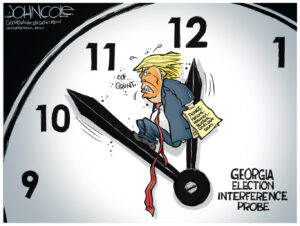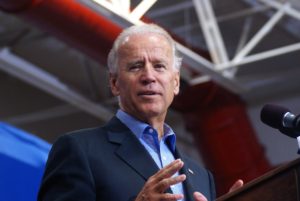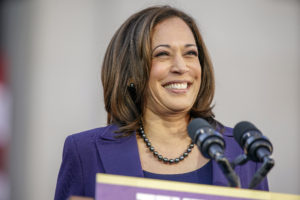Jacqueline Luqman and professor Lester Spence discuss how Bernie Sanders might distinguish himself and contend with black candidates such as Cory Booker and Kamala Harris. Watch the full conversation in the video player above and read the transcript below.
BERNIE SANDERS: Our campaign is not only about defeating Donald Trump, the most dangerous president in modern American history. It is not only about winning the Democratic nomination and the general election. Our campaign is about transforming our country, and creating a government based on the principles of economic, social, racial, and environmental justice.
[TRNN INTRO]
SHARMINI PERIES: It’s The Real News Network. I’m Sharmini Peries, coming to you from Baltimore. And that was Senator Sanders from Vermont announcing his candidacy for 2020 presidential bid. Joining me now to discuss what this means for progressive politics in the country is Jacqueline Luqman and Lester Spence. Jacqueline Luqman is editor-in-chief of the Luqman Nation, and Dr. Lester Spence is professor of political science and Africana Studies at Johns Hopkins University, and the author of Knocking the Hustle: Against the Neoliberal Turn in Black Politics. Thank you both for joining us today.
LESTER SPENCE: Thank you, Sharmini.
JACQUELINE LUQMAN: Happy to be here.
SHARMINI PERIES: All right, Jackie, let me start with you. What do you make of this announcement by Bernie Sanders? And will this announcement shift politics further to the left for the 2020 primaries?
JACQUELINE LUQMAN: Well, now it’s a fight. Now it’s a real fight for what I’ve been saying is the soul of the Democratic Party. Whenever we say that, you know, this party is fighting for its soul, we think about the Republicans. But the Democratic Party has been fighting for its soul for a long time. And I have to borrow from Dr. Spencer’s book title. Now the Democrat Party is in a real fight for whether it wants to continue to be the party of corporate neoliberalism and American imperial militarism, or does it want to be a more progressive, people-focused party. It’s a fight now, and this is going to be a long and interesting campaign season.
SHARMINI PERIES: All right. Dr. Spence, tell us what you think is the distinguishing factors involved in Bernie Sanders’s campaign versus the other progressive candidates that are out there, like that of Elizabeth Warren.
LESTER SPENCE: So what you got are two candidates, basically, in Warren and Sanders, who really have pulled the Democratic Party tendency to the left. And those two–you can distinguish those two from the rest of the field as it stands now in a few different ways. More broadly speaking, I think those two actually understand that we’re in the equivalent of a class war that’s been ongoing. And they’re willing to actually say that out loud, as opposed to the other candidates. If you look at the others as individuals, the two that stand out, because they’re the two people I think who are–at least the people declared–those are the two people who have the best chance. With Kamala Harris you have somebody who has basically pursued really problematic policies while in California on the working class and poor as far as criminal justice, where in somebody like Cory Booker you have somebody who really hasn’t met a policy to privatize the schools that he hasn’t liked.
So whether you look at it individually or as a group, what Warren and Sanders represent is something far different. But how Sanders distinguishes himself from Warren is that Sanders is a card-carrying democratic socialist. And he’s actually, kind of, he’s been implicitly and explicitly attached to kind of a broader movement that has coattails. So certainly if you think about Ocasio-Cortez, we don’t have an Ocasio-Cortez without a Bernie Sanders. Ocasio-Cortez actually worked on Bernie Sanders’s campaign. To a lesser extent we can make claims like that about Rashida Tlaib and other candidates. So it’s not just that he’s a democratic socialist and argues clearly for democratic socialist policies, whereas somebody like Warren is more about kind of an old school New Deal Keynesian reformist. It’s also about Bernie Sanders having these coattails that can actually in the short term and in the long term potentially propel other left-leaning candidates into office at the local, the state, and national level.
SHARMINI PERIES: Now, Dr. Spence, Bernie said all the right things in terms of announcing his candidacy this morning in terms of appealing to the progressive left, and especially people who are concerned about the environment, healthcare, and so forth. But he is up against Kamala Harris, as you mentioned. And she’s also having quite a bit of mass appeal. In fact, she is taking a lot of the voters, young voters from the Democratic Party that, say, supported Obama. And if you are now talking about early primaries and how the chips may fall in places like South Carolina, where these early primaries really matter there. And South Carolina in particular, where there is the largest African-American voter population. So give us a sense of where you think he needs to, say, improve on in order to appeal to those voters.
LESTER SPENCE: One of the arguments that Sanders had to contend with last time out was that he was basically tone deaf on issues of race. And even now you’ve seen there have been a couple of ways that he’s made mistakes that people have, kind of have a tactic for. The biggest predictor of whether somebody actually pulls a voting lever in the voting booth is actually being contacted. Right? So what Bernie Sanders can do to kind of deal with that is really two things. One is clearly articulate a message that brings racial inequality and class inequality together. Whether you’re talking about South Carolina, or even Kamala Harris’s home state of California, that primary is pretty close. He is pretty close in the order. It’s about connecting problems of–arguing that problems of the prison industrial complex are bringing together race and class; that when you talk about issues like poverty and education issues, like for example free public college tuition, those policies are going to disproportionately affect people of color.
SHARMINI PERIES: All right. Jacqueline, Senator Sanders in his announcement actually said, you know, we need to have a diverse community of progressive Americans making this possible. And he actually names a number of communities, and African Americans in particular. And that is a very, very important constituency for any election at this time. And and so you have people, you know, sort of iconic black figures in America like Danny Glover, Nina Turner, Cornell West, and so forth, who supported Bernie Sanders’s candidacy last time around, and will likely do so this time around. I’m basing this on the fact that they were all at the Bernie Sanders Institute Gathering in December. But I think the last time around Bernie called on these folks as his surrogates a little too late in the game. And I think that he has learned from that mistake. Do you think that will make a difference as far as the African American vote is concerned, which is pivotal in the 2020?
JACQUELINE LUQMAN: I think that will make a difference. But I have to agree with Dr. Spence. It’s not going to make–it’s not going to go as far as as he needs it to go. What he really needs to do is to take that–I think it’s over $2 million now–that his campaign has raised just today, and I’m sure it’s more than that, and get a ground team together, starting in South Carolina. There is no frontrunner in this race until the South Carolina primaries come out. So Bernie Sanders needs to–his campaign needs to get a grassroots group of activists with iPads to show that campaign–to knock on people’s doors, show people that campaign video, and say “This is what Senator Sanders wants to do for you.”.
Now, I watched the video just before we did–just before we came on. It’s an amazing campaign video. I’m not in the business of predicting who’s going to win or telling people who to vote for, but he set the bar with that campaign video very high. It still hedges a little bit on calling racial injustice what it is. He just calls it injustice. But the imagery is unmistakable. And that is important, because the connections are made between addressing racial injustice, and improving education, and providing good jobs that will lift people not just out of poverty, but will alleviate some of this racial inequality that people, that black people in particular, are faced with.
So Sanders has to take this campaign money that he raised today, outraising Kamala Harris, her 24 hour total of $1.5 million. He raised $1.5 million in six hours today. He’s got to take that campaign money, pay an army of volunteers from South Carolina, give them iPads, load that video on iPads, and send them out knocking on people’s doors. He has to start doing that today. He can win this primary race, I think, if he does that.
SHARMINI PERIES: And speaking of class struggle, Jacqueline, for the first time we have a woman, an African-American woman, who is running for the presidency. And of course some would argue that is enough to support her. And here I’m talking about Kamala Harris. But clearly you’re a Bernie broad. Tell us why.
JACQUELINE LUQMAN: You know, I like Sanders’s policies in the context of electoral politics. You know, if we’re going to talk about who we vote for in order to enact legislative change, then yes, Bernie Sanders’s policies are far and above better than anybody else’s in the Democratic field. Absolutely. But more, I think, than I am a supporter of Bernie Sanders, I’m also an actual revolutionary. I really want real revolution in this country. And I don’t think that’s something that we can do just by focusing on electoral politics. You know, we can’t elect Bernie Sanders and expect him by himself to change all the things that are wrong in this society. There’s a lot of work we have to do outside of electoral politics, certainly outside of the presidential election, the Democratic primaries, in state and local grassroots organizing, and outside of the electoral system altogether. Political education needs to go on not just in black communities, but across all communities, to educate people on, yes, racial issues, but also class issues, and to make this class struggle clear.
The problem with Kamala Harris is that class issue, because it’s also an issue of the Democrats having bad strategy again, thinking that all they need is a black woman candidate who can Milly Rock to Cardi B–and I don’t know how to Milly Rock, so don’t ask me to do it–who can Milly Rock to Cardi B and have a picture taken with her putting some hot sauce on some greens, and we’re going to vote for her. But when we look at her policies as a prosecutor and the attorney general of California, we see how, Dr. Spence has said, her policies were disastrous. They fed the mass incarceration machine that we all know at this point targets poor, largely black and Latino people in this country. And she made justification for it. She made excuses for it. Her record, her criminal justice record, is deeply, deeply problematic in regard to the targeting and continued demonization of black people, of black men. That matters. That absolutely matters. So it’s not enough for her–it’s not enough that she is a woman and that she’s black. She’s also a woman who is black who has horrendous policies that most black people, when they find out about them, they don’t want them enacted on a national level, because we’ve been living that for a very long time. We want that to end.
SHARMINI PERIES: All right. Dr. Spence, let me give you the last word here. We live in a culture where we like stars, and Kamala Harris certainly seems like she has what it takes for that stardom in terms of electoral politics. But given that you’ve written the book called Knocking the Hustle: Against the Neoliberal Turn in Black Politics, how does Bernie even begin to relate to the upper classes in the black community? Or does he just abandon them and try to speak to the working class?
LESTER SPENCE: I would argue that he go directly to working class and middle-income black voters. Because if you look at it, they represent the bulk of the voting capacity of black communities. They’re going to be the ones who are most affected positively. And arguably, to the extent that this is also not just about him as an individual, this is about building kind of a cohort of progressive and left-leaning candidates at the local, state, and national level, it’s in those spaces, right.
I mean, you can think about Ocasio-Cortez. She was a bartender. Rashida Tlaib, she was an organizer. What you want to do is build that base. So it is about him trying to win, but it’s also about building a base from which we can build new institutions and get people running for office. You actually do that by finding where the, excuse my language, where the ass power is. And the ass power in black communities have always been an working class communities. Very, very, very, very, very rarely have they been in black professional communities. And as a side note, I got the term “ass power” from Coleman Young, first black mayor in Detroit. Always got to give a shout out to Detroit.
SHARMINI PERIES: All right. I’ve been speaking with Professor Lester Spence, professor of political science and Africana studies at Johns Hopkins University; and Jacqueline Luqman, she’s the editor-in-chief of Luqman Nation. Thank you both for joining us today.
LESTER SPENCE: Thank you.
JACQUELINE LUQMAN: Thank you so much.
SHARMINI PERIES: And thank you for joining us here on The Real News Network.






